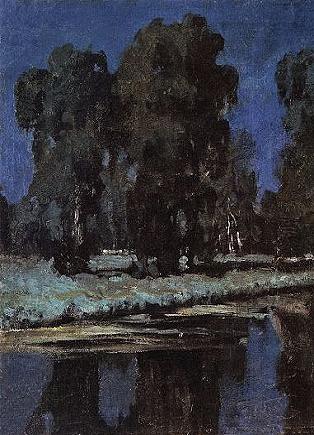Mikhail Alexeevich Kuzmin (1872-1936) was a greatly gifted man. He had the artistic skills sufficient to professionally illustrate his many books of verse. He studied music under Rimsky-Korsakov, and was able to set many of his poems to music, accompanying himself on the piano in literary salons. He published twelve books of poetry in conventional and free verse forms,
exhibiting a craft mastery in both. Besides a great deal of translation in his later years, he wrote several novels,
over a hundred short stories and forty dramatic works. And yet, though on good terms with the great poets of the Silver Age, Kuzmin is not normally mentioned
in the same breath. Why?
Perhaps because he was too accomplished and versatile, as Cocteau was in France, exhibiting a facile ease that showed little of the hard struggle with outmoded conventions
expected of the revolutionary future. Mirsky calls this style 'stylization': work of great delicacy but to some extent a pastiche, employing forms from earlier
decades.

Kuzmin is best known for his 'Alexandrian Songs', and bright-coloured descriptive pieces also form the bulk of his work. He often comes over as the languid
aesthete, with themes redolent of love, light and gracefully treated, but still scented with delicately homosexual traits.
But his later poems can be much direct and challenging, as were his depictions of a cold Petrograd in the 1920s, the city slowly starving to death under Soviet mismanagement.
О, быть покинутым...
О, быть покинутым — какое счастье!
Какой безмерный в прошлом виден свет
Так после лета — зимнее ненастье:
Все помнишь солнце, хоть его уж нет.
Сухой цветок, любовных писем связка,
Улыбка глаз, счастливых встречи две, —
Пускай теперь в пути темно и вязко,
Но ты весной бродил по мураве.
Ах, есть другой урок для сладострастья,
Иной есть путь — пустынен и широк.
О, быть покинутым — такое счастье!
Быть нелюбимым — вот горчайший рок
Kuzmin's poem is written in iambic pentameters rhymed AbAb
О, быть поки́нутым — како́е сча́стье! 5A
Како́й безме́рный в про́шлом ви́ден свет 5b
Так по́сле ле́та — зи́мнее нена́стье: 5A
Всё по́мнишь со́лнце, хоть его́ уж нет. 5b
A TTS (text to speech) recording of the first five stanzas is:
Ruverses have the one translation by Yevgeny Bonver, I give his first stanza:
What utter happiness is it to be forsaken!
What heaven's light can one see in the past! —
Like when cold winter after summer breaks in,
We dream of sun that long ago left us.
To be abandoned — O what happiness,
a heavenly blaze illuminates the past.
Out of summer, winter storms may bless
with thoughts of sunlight though that's gone at last.
What one dry flower, or bound up letters say,
or smiling eyes of lovers when they meet.
Though now be dark and uphill all the way:
you walked the springtime grass on naked feet.
So one lesson for voluptuaries:
far worse it is where empty shadows fall.
To be abandoned later — bliss that is
compared to love that's never known at all.
There are some problems with this. It's rather free (a literal rendering of the second line would be: 'What an immense light is visible in the past'), and the verse is not particularly attractive. Correcting matters gives us:
To be abandoned brings great happiness:
immense the light that clarifies the past.
After summer, winter storms regress
to sun remembered, though that's gone at last.
It's what dried flower, or bundled letters say,
or smiling eyes of lovers when they meet:
though now it's dark and uphill all the way,
you walked the springtime grass on naked feet.
Another lesson for voluptuaries:
a path where wide and empty shadows fall.
To be abandoned: happiness it is —
to be unloved the bitterest fate of all.
1. Bristol, E. A History of Russian Poetry (1991, O.U.P.) 220-21.
2. Mirsky, D.S. A History of Russian Literature. (Alfred A: Knopf, 1926 / Vintage, 1958) 238-39.
3. Chandler R. et al. The Penguin Book of Russian Poetry (Penguin, 2015) 168-70.
4. Poems by Mikhail Kuzmin. Introduction on Ruverses.
Russian poem translations on this site: listing.